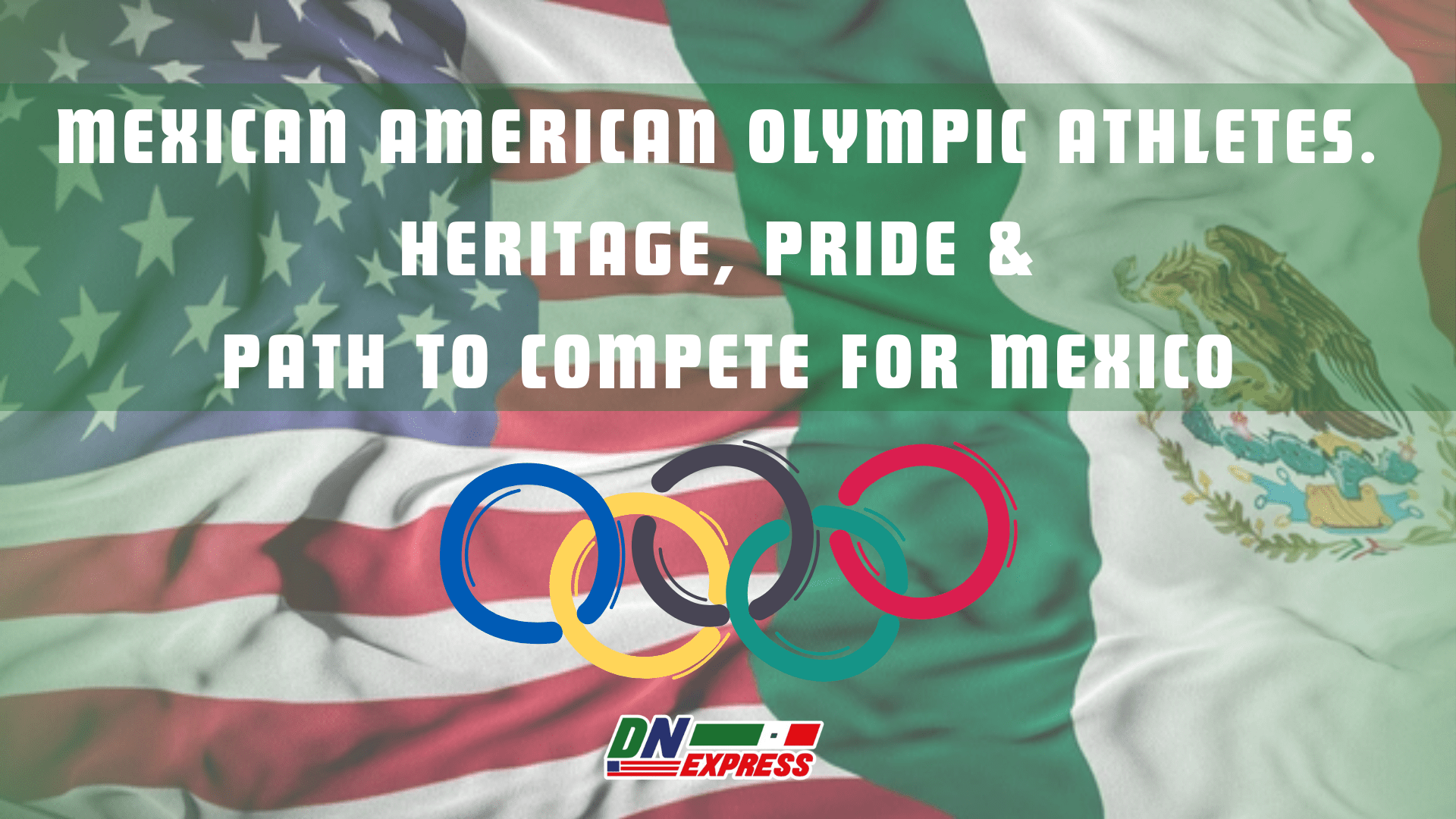
Mexican American Olympic athletes shine on both Team USA and Team Mexico, using dual citizenship to compete, honor heritage, and open global opportunities.
From Julián Araujo to Lisa Fernandez, discover who they are, why nationality matters, and how you can claim yours.
For some, it's about reconnecting with their roots. For others, it's a strategic path to more roster spots, avoiding long consulate waits, or securing benefits for their children.
Whether your goal is cultural pride, property in Mexico, or an Olympic jersey, the path to dual citizenship can be life-changing.
Through Doble Nacionalidad Express, we help athletes and families secure Mexican nationality quickly and without consulate delays, removing the red tape that keeps too many talented people off the field.
If you want to represent Mexico or pass citizenship to the next generation, we make it happen.
Below, we'll break down who qualifies, how the process works, and why it's shaping the careers of Mexican American athletes across every sport.
Who Are Mexican American Olympic Athletes?
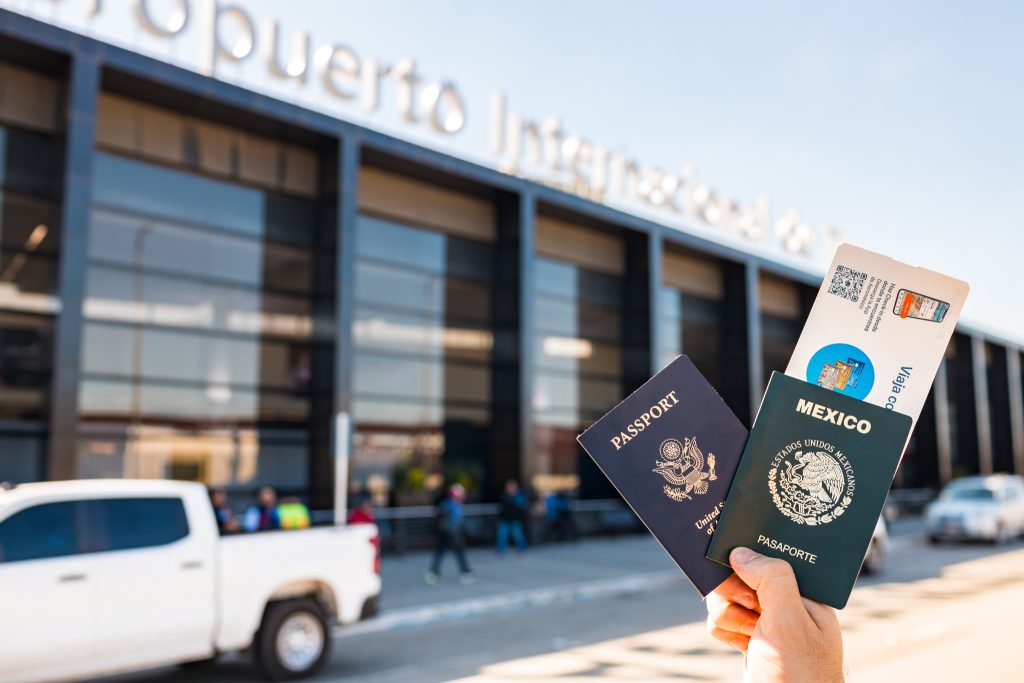
Mexican American Olympic athletes are competitors born in the United States with Mexican heritage, often the children or grandchildren of Mexican citizens who use their dual nationality to compete for either Team USA or Team Mexico.
This heritage gives them a unique position: they carry the cultural pride, traditions, and family histories of Mexico while growing up in and representing the U.S. sports system.
On the world stage, they embody both nations. Whether stepping onto the pitch in green or red, white, and blue, they connect two passionate fan bases and serve as visible proof of the ties that bind both countries.
Their presence goes beyond athletic performance. It's cultural diplomacy through sport.
Some of the most notable names include:
- Julián Araujo: Soccer player who represented the U.S. youth system before joining Mexico's national team.
- Efraín Álvarez: LA Galaxy forward who chose to represent Mexico internationally.
- Jonathan Gómez: Rising soccer talent balancing U.S. and Mexican representation.
- Lisa Fernandez: Legendary softball pitcher and three-time Olympic gold medalist for Team USA, proud of her Mexican heritage.
- Diana Taurasi: Basketball icon with multiple Olympic golds, blending U.S. competitive fire with her Mexican roots.
While exact numbers shift with each Olympic cycle, the pattern is clear. Dozens of Mexican Americans compete for Team USA, and a smaller but growing group elects to compete for Team Mexico, especially in sports where roster spots are more accessible or where cultural pride takes center stage.
Why Mexican American Athletes Choose to Represent Mexico
For many Mexican American athletes, the decision to compete for Mexico goes beyond sport. It's deeply personal, practical, and strategic.
The motivations often blend identity, opportunity, and long-term family goals.
Reconnect with heritage: personal identity, family pride
Representing Mexico allows athletes to honor their parents' and grandparents' sacrifices, embrace their roots, and play for the flag they grew up seeing in their homes.
It's a way of telling the world, “This is where I come from.”
Avoid consulate delays/rejections: streamlined nationality process for eligibility
Long waits, inconsistent rules, and even outright rejections from Mexican consulates have kept athletes off the field.
By securing citizenship through a streamlined, attorney-backed process, athletes meet eligibility deadlines without missing key tournaments or Olympic qualifiers.
Pass citizenship to children: legacy for future generations
Dual nationality goes beyond the athlete. It's a gift that can be passed to children's citizenship eligibility.
Competing for Mexico today ensures that their children and grandchildren will have the same legal and cultural rights in the future.
Practical benefits: property, healthcare, residency options
Beyond competition, Mexican citizenship unlocks the ability to own property without restrictions, access national healthcare programs, and live or retire in Mexico without immigration hurdles.
Pursue opportunities: roster spots, less competition in certain sports
For athletes in highly competitive U.S. programs, Mexico may offer open roster spots, a faster path to the international stage, and a chance to compete at the highest levels. This includes the Olympics, Pan American Games, or World Championships.
Paths to the Olympics for Dual Citizens
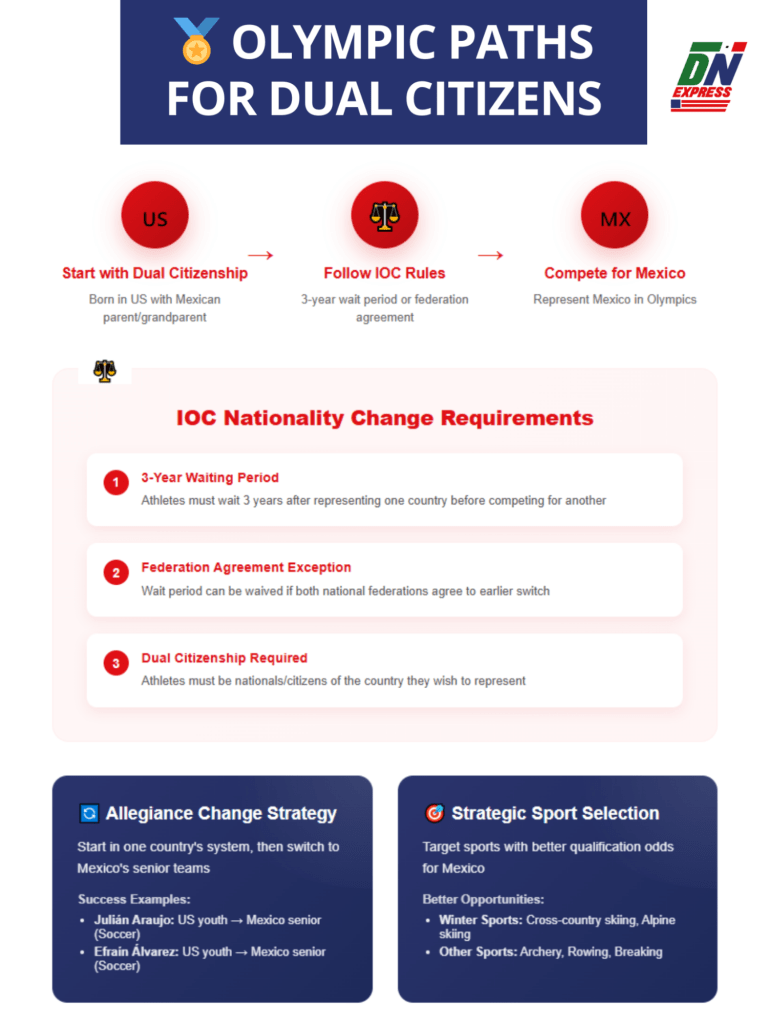
For athletes with dual citizenship, the Olympics can open up in two directions. Switching national allegiance is a process governed by strict international rules.
Most sports follow the International Olympic Committee (IOC) guidelines: if an athlete has represented one country, they must wait a designated period (often three years) before competing for another, unless both national federations agree to an earlier switch.
Examples of athletes changing allegiance
Soccer standouts like Julián Araujo and Efraín Álvarez began in the U.S. youth system before officially joining Mexico's senior team.
This is common in sports where both nations actively scout binational talent.
Targeting lesser-known sports for higher qualification odds
Athletes don't always need to compete in marquee sports to become Olympians.
Disciplines like cross-country skiing or alpine skiing may have Olympic slots available for countries with smaller winter sports programs, giving Mexican nationals a better shot at qualifying compared to crowded sports like speed skating.
Q&A: Key questions for aspiring Mexican American Olympians
- How many Mexican athletes are in the Olympics? Numbers vary by year, but Mexico typically sends between 80-100 athletes to the Summer Games and a smaller delegation (often fewer than 10) to the Winter Games.
- Which sports are easier to qualify for Mexico? Sports with less national depth, such as certain winter disciplines, archery, or rowing, often provide open roster spots compared to high-demand sports like gymnastics or track.
- Why are so many U.S.-born players on Mexico's softball team? Eligibility rules allow athletes with a Mexican parent or grandparent to compete, and Mexico actively recruits talent from U.S. college programs to build competitive rosters.
- Are there any Hispanics in the Winter Olympics? Yes, Mexican Americans and other Latino athletes have competed in skiing, snowboarding, and ice events, though they make up a small fraction of total participants.
With the right sport choice and a clear citizenship strategy, dual nationals can position themselves to qualify for events that might otherwise feel out of reach.
Challenges & Worries Athletes Face
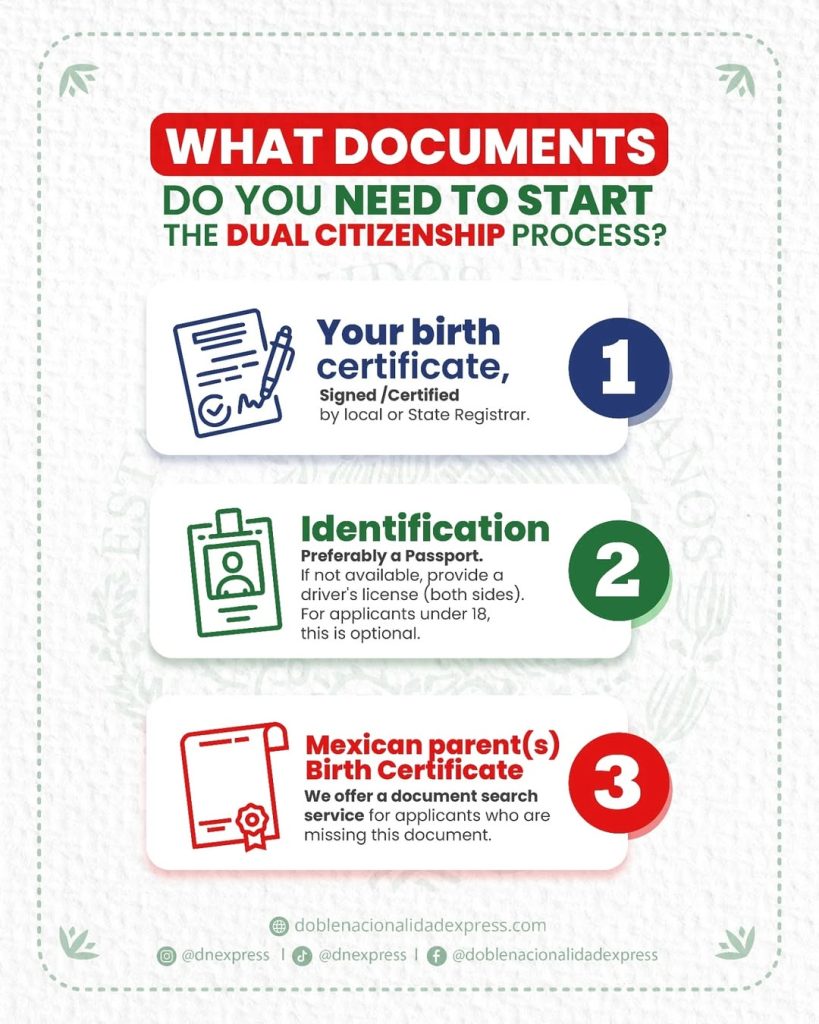
While the path to representing Mexico can be rewarding, it comes with challenges, both emotional and logistical.
Fear of not being “good enough” for a new sport
Athletes considering switching to a lesser-known sport for easier Olympic qualification often worry they'll be outmatched by experienced competitors.
Starting fresh in disciplines like alpine skiing or archery can feel daunting.
Confusion over eligibility rules
International sports governance can be complex. Athletes may not know waiting periods, federation approvals, or the documentation needed to prove nationality, especially if their parents were never formally registered as Mexican citizens.
Concerns about legitimacy when using universality slots
Some worry that qualifying through a universality placement, a system that ensures global representation, may be seen as less “earned” than traditional qualification, even though it is an official Olympic pathway.
Pressure from fans and media about “loyalty”
Switching allegiances can invite criticism from both sides.
U.S. fans may feel abandoned, while some Mexican supporters question athletes' authenticity if they didn't grow up in Mexico.
Emotional costs of dual belonging
Balancing two national identities is powerful but complex. Athletes often feel they're carrying the weight of two flags, two expectations, and two very different sporting cultures.
These challenges are real, but with the right guidance, preparation, and community support, they don't have to be career-ending roadblocks. Many athletes find helpful answers in our frequently asked questions.
Famous Mexican American Olympic & Pro Athletes
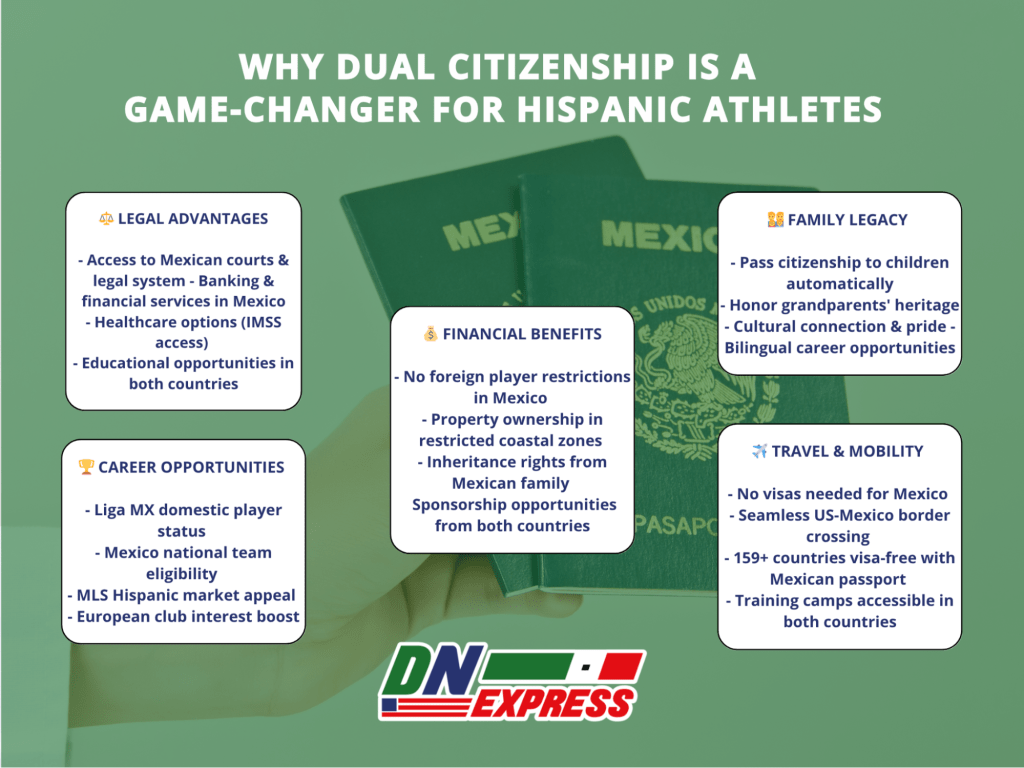
Mexican American athletes have left their mark on the Olympic stage in both the Summer and Winter Games, proving that cultural pride and world-class performance can go hand in hand.
Summer Games standouts
- Lisa Fernandez (Softball): Three-time Olympic gold medalist for Team USA, recognized as one of the greatest pitchers in softball history, proudly representing her Mexican heritage.
- Diana Taurasi (Basketball): Five-time Olympic gold medalist, widely regarded as one of the best players in women's basketball, with deep Mexican roots.
- Laurie Hernandez (Gymnastics): Olympic gold and silver medalist known for her artistry and infectious energy, proudly representing her Puerto Rican and Mexican heritage.
Winter Games pioneers
Fewer in number but equally inspiring, Mexican Americans have competed in skiing, snowboarding, and ice events.
For many, these sports offer unique opportunities due to smaller national programs in Mexico, making qualification easier to achieve.
Emerging sports and new icons
- Victor Montalvo (Breaking): A trailblazer bringing breaking (breakdancing) to its Olympic debut, blending athletic skill with cultural expression.
- Divers such as Kevin Berlin and Randal Willars, though representing Mexico directly, inspire many binational athletes to see aquatics as a path to Olympic success.
These figures represent achievement beyond medal counts. They're cultural ambassadors, showing the next generation that heritage can be a source of strength on the world stage.
How to Secure Mexican Citizenship for Olympic Eligibility
For athletes of Mexican descent, securing citizenship can be the key that unlocks Olympic opportunities. Understanding the history of dual citizenship helps clarify why this path has become increasingly accessible.
The process is often faster and easier to navigate than many realize, if you know where to start.
Who qualifies
If you are the child or grandchild of a Mexican citizen, you are generally eligible for Mexican nationality, regardless of whether you were born in the U.S.
Even if your parents were never registered in Mexico, you may still be able to establish your claim through birth certificates and other official documents, including document translation services if needed.
The time-sensitive nature for athletes
In sports, timing is everything. Citizenship must be approved before national team tryouts, tournament rosters, and Olympic qualification deadlines.
Missing a single date can mean waiting another year, or even another Olympic cycle, to compete.
Frequent mistakes when going DIY
- Mismatched names on birth certificates and IDs that cause application rejections.
- Missing apostilles (official document authentications) that delay processing.
- Relying on consulate appointments that are booked months out, putting eligibility at risk.
Strategic nationality and smaller-nation slots
Choosing to represent Mexico can open doors in sports where the U.S. has deep rosters. In some cases, especially in lesser-populated disciplines, Mexico has open or easier-to-earn Olympic slots, allowing talented but overlooked athletes to step onto the world stage.
When the stakes are high and the window is small, the right legal guidance can make the difference between watching the Games on TV and walking into the opening ceremony.
Why Work With Doble Nacionalidad Express
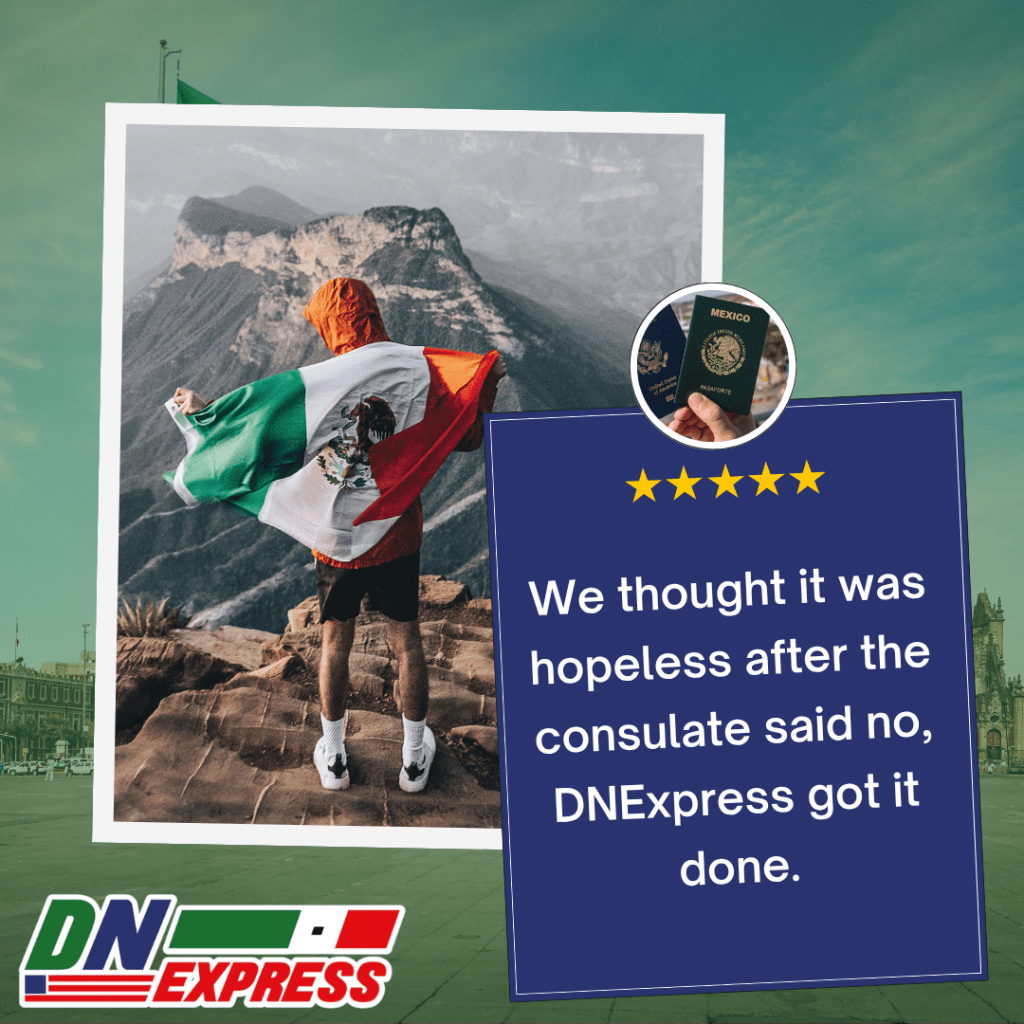
Securing Mexican citizenship should be a clear, efficient process, especially when your Olympic dreams are on the line.
We've built a service designed for speed, accuracy, and peace of mind.
Fully remote, attorney-backed, no consulate visits
We handle your entire case online, supported by a licensed, binational legal team.
You won't need to take time off training or travel for frustrating consulate appointments.
Specialists in difficult and rejected cases
With over 3,000 successful citizenship grants, we've rescued countless athletes and families who were previously turned away or stuck in limbo.
Affordable, transparent pricing with payment plans
We believe this process should be accessible to everyone, not only those who can afford steep legal retainers.
Our transparent pricing and flexible plans make it possible to start immediately.
Large bilingual support team for fast answers
Our team grasps both the legal and cultural nuances of this process.
We respond quickly so you're never left wondering where your application stands.
Offices in both the U.S. and Mexico
We can pull records, correct birth certificates, and handle in-country requirements without you ever boarding a plane.
The downside of doing it yourself
- Lost seasons due to missed deadlines or rejected paperwork.
- Travel expenses to Mexico to fix records or gather documents.
- Multiple consulate rejections before finally finding professional help.
When every day counts, you need a partner who knows how to get it done right the first time.
Your Next Step
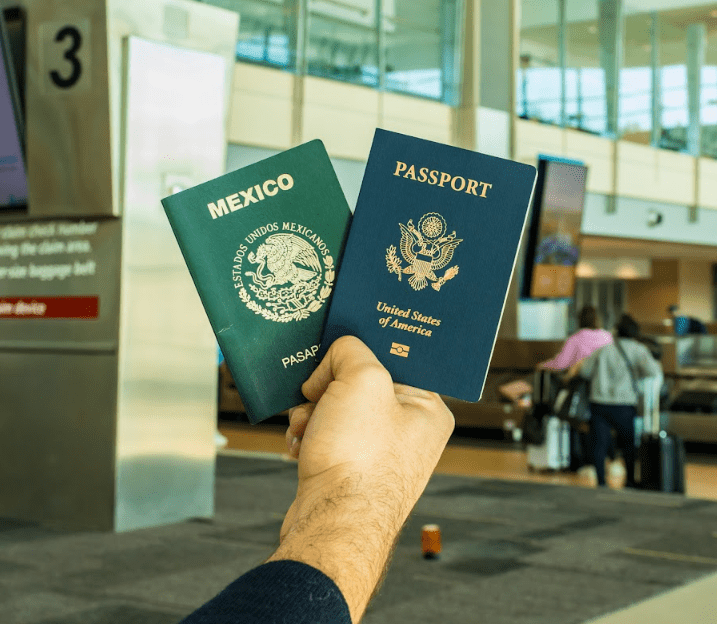
If you're ready to explore your eligibility for Mexican citizenship, whether for Olympic competition, family legacy, or personal pride, the process can start today.
Free case review in 5-15 minutes
Our team can quickly determine if you qualify through a free case review, saving you weeks or months of uncertainty.
WhatsApp, call, or email for fast answers
We're available on the platforms you already use, responding promptly so your momentum never stalls.
A clear, step-by-step process
- Eligibility check: Confirm your right to citizenship.
- Document review: Ensure all records are accurate and complete.
- Legal filing: Submit your application through our attorney-backed system.
- Citizenship granted: Receive your Mexican nationality and passport.
Apply for Mexican citizenship now, without the consulate.
With the right partner, this doesn't have to be a years-long ordeal. It's a streamlined path that protects your time, your eligibility, and your future.
FAQ: Frequently Asked Questions
Who is Mexico's most famous Olympian?
Many point to track and field legend Ana Guevara or boxer Oscar De La Hoya (who competed for the U.S. but embraces his Mexican identity).
Who is a famous Hispanic athlete?
Beyond the Olympics, stars like Canelo Álvarez (boxing) and Alex Verdugo (baseball) are household names.
Which Hispanic athletes play on U.S. teams?
Athletes like Laurie Hernandez, Diana Taurasi, and Alex Verdugo have represented the U.S. while proudly celebrating their Hispanic heritage.
How Can Mexican American Athletes Qualify to Represent Mexico in the Olympics?
Athletes with at least one Mexican parent or grandparent can usually claim citizenship, even if born in the U.S. Learn more about dual nationality policies from official sources.
Once citizenship is granted, they must meet Olympic sport-specific qualification rules and deadlines.
What Sports Offer Easier Olympic Qualification for Mexico?
Sports with fewer national competitors, such as certain winter disciplines, archery, rowing, or breaking, often have open roster spots compared to heavily contested sports like gymnastics or track.
Can I Get Mexican Citizenship Without Visiting the Consulate?
Yes. Through attorney-backed services like Doble Nacionalidad Express, eligible applicants can complete the entire process remotely, avoiding long consulate waits and travel expenses. The U.S. State Department provides detailed information about dual citizenship policies.



